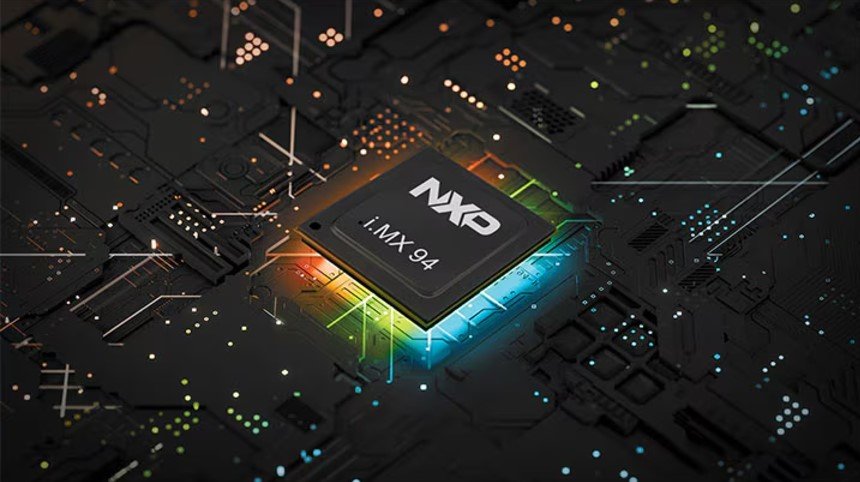electronics-journal.com
15
'24
Written on Modified on
NXP News
NXP’s Presents New i.MX 94 Family of Applications Processors
The latest applications processors enable real-time industrial control with TSN support, protect against quantum attacks with integrated post-quantum cryptography, & minimize downtime using AI-powered neural processing.
www.nxp.com

NXP Semiconductors announced the i.MX 94 family, the newest addition to its i.MX 9 series of applications processors, designed for industrial control, programmable logic controllers (PLCs), telematics, industrial and automotive gateways, and building and energy control.
Secure, real-time communication is essential for both industrial and automotive applications. Increasingly complex industrial environments rely on a wide variety of communications protocols, requiring an intelligent TSN switch to manage real-time communication and control needs. In the automotive industry, the accelerating shift towards software-defined vehicles means that underlying vehicle architectures increasingly rely on Ethernet-based communications.
By integrating communications, safety and real-time control features into a single SoC, the i.MX 94 family helps designers navigate this growing complexity, ensuring optimized end-to-end performance when coordinating real-time communication and actions. The integrated 2.5 Gbps Ethernet TSN switch enables highly configurable, secure communications with rich protocol support for both industrial and automotive applications.
Multi-Core Design Delivers High Performance, Low Latency Intelligent Edge Processing
The multi-core i.MX 94 family of 64-bit applications processors features up to four Arm® Cortex®-A55 cores capable of running Linux, along with two Cortex-M33 cores and two Cortex-M7 cores to offer increased real-time processing capability. NXP's Real-Time Edge software framework enables developers to realize designs with an optimal combination of real-time and application-level tasks running across any of these cores. In addition, a variety of third-party purpose-built commercial operating systems such as QNX Neutrino and Green Hills Integrity are available to harness the compute capabilities. It also features an integrated functional safety island, along with configurable safety partition, to support IEC61508 SIL2 and ISO26262 ASIL-B compliance.
Purpose-Built for Complex Networking Environments
The i.MX 94 family includes the first i.MX applications processor to integrate a 2.5 Gbps Ethernet TSN switch, featuring fast initialization and support for low power modes. NXP’s real-time edge software supports a wide variety of industrial protocols from legacy implementations to the latest developments such as OPC-UA FX and OPC-UA PubSub. With hardware support for network virtualization, the i.MX 94 family supports software-defined networking, which is key to enabling complex, multicore use-cases based on open standards such as XDP and DPDK. The i.MX 94 family supports traditional serial fieldbus protocols such as Profibus, Modbus, CANopen and IO-Link, as well as Ethernet-based real-time networking protocols, such as Profinet, EtherCAT, Ethernet/IP, CC-Link, and more. Additionally, the TSN implementation of these protocols, including AVB/TSN, Ethernet OPC-UA, Profinet Over TSN and more, are also supported. This makes the i.MX 94 family well-suited for current and future industrial automation applications.
Advanced Security Protects Against Quantum Attacks
The i.MX 94 family is NXP’s first applications processor to support post-quantum, public key cryptography, allowing it to withstand attacks by quantum computers, and manage security of equipment over a long lifecycle. The integrated EdgeLock Secure Enclave (Advanced Profile) allows it to set the equipment and restore it to a trusted state at any time and provides advanced security capabilities, including secure boot, secure debug and secure update of the processor based on post-quantum cryptography without compromising performance. It also features runtime protections, such as expelling an attacker with automatic recovery to a trusted state, or EdgeLock 2GO key management.
For industrial TSN and automotive connectivity applications, the i.MX 94 incorporates EdgeLock Accelerator (Prime), a crypto-accelerator enabling fast boot, and real-time, high-speed message signing, authentication and encryption at 5G speeds for secure communications.
The i.MX 94 family provides support for security standards such as IEC 62443 and ISO 21434, as well as upcoming regulations such as the Cyber Resilience Act in Europe. This gives OEMs and asset owners new means to handle and recover from cyber incidents in the field, preserving availability of equipment and limiting the impact of attacks.
Integrated NPU Delivers AI and Machine Learning Capabilities
Supported by NXP’s eIQ machine learning software development environment, NXP’s eIQ Neutron NPU delivers 0.5 TOPS of machine learning performance, enabling predictive maintenance and operator guidance in real time as well as defects scanning and machine diagnostics. The NPU provides highly adaptable and scalable security features by providing intrusion detection and protection with machine learning-assisted cybersecurity to keep critical systems and infrastructure safe from manipulation into the future.
Comprehensive Developer Enablement Across Systems Solutions
Delivering scalability across the larger i.MX portfolio, the i.MX 94 family supports a system-level design approach. This includes enablement with NXP’s PF9455 PMIC, a co-developed and cost-optimized power management solution. The i.MX 94 family seamlessly integrates with NXP’s broad, scalable portfolio of wireless solutions. This includes the IW612 tri-radio solution for industrial and IoT applications, designed to easily connect smart devices across protocols and ecosystems with support for Wi-Fi 6, Bluetooth 5.2 and 802.15.4. It also includes the highly integrated AW693 SoC, designed to deliver advanced automotive security with concurrent dual Wi-Fi 6E and Bluetooth 5.3 to enable multiple secure connections within the car, supporting the transition to software-defined vehicles.
www.nxp.com

